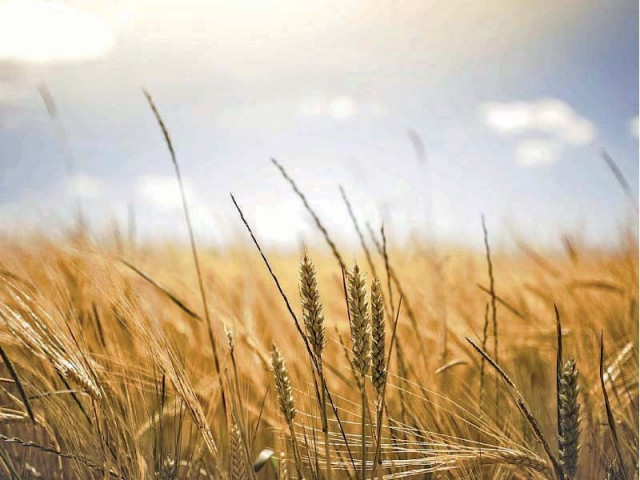PTI govt okays levy of fuel price adjustment on farmers
Allows procurement of 8.25m tonnes of wheat, imposes ban on onion export

The ECC turned down a proposal to allow the Trading Corporation of Pakistan to import 500,000 tonnes of wheat. Instead, it allowed the private sector to import the grain. PHOTO: FILE
Headed by Adviser to Prime Minister on Finance Dr Abdul Hafeez Shaikh, the Economic Coordination Committee (ECC) of the cabinet also imposed a ban on the export of onions. But it rejected a proposal for stopping the export of red chilli whose prices had increased significantly.
The ECC turned down a proposal that called for permitting the Trading Corporation of Pakistan to import 500,000 tonnes of wheat. Instead, it allowed the private sector to import grain.
After wheat and sugar, onion was the third commodity whose export was banned due to rising prices. Onion export has been banned till the end of May aimed at restricting the rise in prices in Ramazan.
After the allocation of subsidies fell short of the need, the ECC gave ex-post facto approval to the application of fuel price adjustment to the electricity consumed by farmers.
Trend of double-digit rise in public debt stops
It decided to recover the charges from the farmers over a period of six months. It was decided that a maximum fuel price adjustment of Re1 per unit would be charged in any month and the remaining cost would be recovered in the next electricity bills.
The charges will be recovered from January to June 2019 and by that time the government plans to bring a new policy. The decision is likely to increase the input cost for the farmers, which will also raise the cost of production of essential food items. However, the government does not have the fiscal space to afford unlimited subsidies. It will either have to recover some of the cost from the farmers or to cross-subsidise it.
However, a Power Division spokesman claimed that no new decision to recover the fuel price adjustment with effect from January this year was taken and added that tariff determination and fuel price adjustment determination were very clear on it.
The fuel price adjustment is charged as per these determinations from all subsidised and non-subsidised categories of consumers. Nothing new in this regard is being done and set procedures are not changed, said the spokesman.
He did not explain what the need was to take the summary to the ECC, if there was no change in the procedures and enforcement of fuel price adjustment.
The ECC deferred decision on providing subsidised electricity to 29,000 agricultural tube wells in Balochistan for one more year. It decided to first take a briefing from the Balochistan chief secretary.
The Pakistan Tehreek-e-Insaf (PTI) government has also failed to limit the circular debt in the power sector that is increasing at a pace higher than that witnessed in the PML-N tenure. There were also serious questions over the authenticity of the efficiency gains claimed by the Power Division. The total stock and flow of the circular debt has almost touched Rs1.8 trillion, according to the Power Division. The ECC also approved to procure 8.25 million tonnes of wheat from the farmers, which is double the quantity that the federal and four provincial governments had procured last year.
The ECC had last year set the wheat procurement target at 6.25 million tons but all the governments procured only four million tonnes, which led to over 40% reduction in stocks this year. The government’s ill-timed decision to allow export of wheat also contributed to a steep reduction in stocks.
Govt mull options to control inflation
The ECC decided that the public sector would procure 8.25 million tonnes of wheat at the rate of Rs1,365 per 40 kilogram, according to the finance ministry. This will require at least Rs112 billion to procure the commodity from the farmers.
The ECC also decided on allocation of additional 100,000 tonnes of wheat to Khyber-Pakhtunkhwa and 50,000 tonnes to Sindh from PASSCO to cater for scarcity in the provinces before the next crop comes. The ECC approved to amend Import Policy Order, 2016 to allow commercial importers to import acetone, anthranilic acid, ethyl ether, hydrochloric acid and sulphuric acid on the recommendations of the Ministry of Narcotics Control.
It was also decided to change the billing mechanism for RLNG/gas supply to export-oriented industry. The export-oriented industry would only pay $6.5 per mmbtu against actual invoices raised by Sui Northern Gas Pipelines (SNGPL) owning to the direction of the Lahore High Court.
The ECC allowed SNGPL to sign Gas Sale Agreement with 1,263.2MW RLNG-based power generation project near Trimmu Barrage by Punjab Thermal Power (Pvt) Limited on “as available” basis.
The committee approved technical supplementary grant of Rs451.7 million for Naya Pakistan Housing and Development Authority. A technical supplementary grant of Rs110 million was approved in favour of Ministry of Planning for Afghan projects.
The ECC also approved Rs5.9 million for capacity building of teachers training institutes and training of elementary teachers in former FATA, G-B, AJK and ICT.
Published in The Express Tribune, February 20th, 2020.
Like Business on Facebook, follow @TribuneBiz on Twitter to stay informed and join in the conversation.



















COMMENTS
Comments are moderated and generally will be posted if they are on-topic and not abusive.
For more information, please see our Comments FAQ